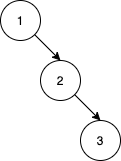Given an array nums that represents a permutation of integers from 1 to n. We are going to construct a binary search tree (BST) by inserting the elements of nums in order into an initially empty BST. Find the number of different ways to reorder nums so that the constructed BST is identical to that formed from the original array nums.
- For example, given
nums = [2,1,3], we will have 2 as the root, 1 as a left child, and 3 as a right child. The array[2,3,1]also yields the same BST but[3,2,1]yields a different BST.
Return the number of ways to reorder nums such that the BST formed is identical to the original BST formed from nums.
Since the answer may be very large, return it modulo 109 + 7.
Example 1:
Input: nums = [2,1,3] Output: 1 Explanation: We can reorder nums to be [2,3,1] which will yield the same BST. There are no other ways to reorder nums which will yield the same BST.
Example 2:
Input: nums = [3,4,5,1,2] Output: 5 Explanation: The following 5 arrays will yield the same BST: [3,1,2,4,5] [3,1,4,2,5] [3,1,4,5,2] [3,4,1,2,5] [3,4,1,5,2]
Example 3:
Input: nums = [1,2,3] Output: 0 Explanation: There are no other orderings of nums that will yield the same BST.
Constraints:
1 <= nums.length <= 10001 <= nums[i] <= nums.length- All integers in
numsare distinct.
Solution 1: Combination Counting + Recursion
We design a function
Next, let's take a look at how
For an array
where
Note the modulo operation of the answer, because the value of
The time complexity is
class Solution:
def numOfWays(self, nums: List[int]) -> int:
def dfs(nums):
if len(nums) < 2:
return 1
left = [x for x in nums if x < nums[0]]
right = [x for x in nums if x > nums[0]]
m, n = len(left), len(right)
a, b = dfs(left), dfs(right)
return (((c[m + n][m] * a) % mod) * b) % mod
n = len(nums)
mod = 10**9 + 7
c = [[0] * n for _ in range(n)]
c[0][0] = 1
for i in range(1, n):
c[i][0] = 1
for j in range(1, i + 1):
c[i][j] = (c[i - 1][j] + c[i - 1][j - 1]) % mod
return (dfs(nums) - 1 + mod) % modclass Solution {
private int[][] c;
private final int mod = (int) 1e9 + 7;
public int numOfWays(int[] nums) {
int n = nums.length;
c = new int[n][n];
c[0][0] = 1;
for (int i = 1; i < n; ++i) {
c[i][0] = 1;
for (int j = 1; j <= i; ++j) {
c[i][j] = (c[i - 1][j] + c[i - 1][j - 1]) % mod;
}
}
List<Integer> list = new ArrayList<>();
for (int x : nums) {
list.add(x);
}
return (dfs(list) - 1 + mod) % mod;
}
private int dfs(List<Integer> nums) {
if (nums.size() < 2) {
return 1;
}
List<Integer> left = new ArrayList<>();
List<Integer> right = new ArrayList<>();
for (int x : nums) {
if (x < nums.get(0)) {
left.add(x);
} else if (x > nums.get(0)) {
right.add(x);
}
}
int m = left.size(), n = right.size();
int a = dfs(left), b = dfs(right);
return (int) ((long) a * b % mod * c[m + n][n] % mod);
}
}class Solution {
public:
int numOfWays(vector<int>& nums) {
int n = nums.size();
const int mod = 1e9 + 7;
int c[n][n];
memset(c, 0, sizeof(c));
c[0][0] = 1;
for (int i = 1; i < n; ++i) {
c[i][0] = 1;
for (int j = 1; j <= i; ++j) {
c[i][j] = (c[i - 1][j] + c[i - 1][j - 1]) % mod;
}
}
function<int(vector<int>)> dfs = [&](vector<int> nums) -> int {
if (nums.size() < 2) {
return 1;
}
vector<int> left, right;
for (int& x : nums) {
if (x < nums[0]) {
left.push_back(x);
} else if (x > nums[0]) {
right.push_back(x);
}
}
int m = left.size(), n = right.size();
int a = dfs(left), b = dfs(right);
return c[m + n][m] * 1ll * a % mod * b % mod;
};
return (dfs(nums) - 1 + mod) % mod;
}
};func numOfWays(nums []int) int {
n := len(nums)
const mod = 1e9 + 7
c := make([][]int, n)
for i := range c {
c[i] = make([]int, n)
}
c[0][0] = 1
for i := 1; i < n; i++ {
c[i][0] = 1
for j := 1; j <= i; j++ {
c[i][j] = (c[i-1][j] + c[i-1][j-1]) % mod
}
}
var dfs func(nums []int) int
dfs = func(nums []int) int {
if len(nums) < 2 {
return 1
}
var left, right []int
for _, x := range nums[1:] {
if x < nums[0] {
left = append(left, x)
} else {
right = append(right, x)
}
}
m, n := len(left), len(right)
a, b := dfs(left), dfs(right)
return c[m+n][m] * a % mod * b % mod
}
return (dfs(nums) - 1 + mod) % mod
}function numOfWays(nums: number[]): number {
const n = nums.length;
const mod = 1e9 + 7;
const c = new Array(n).fill(0).map(() => new Array(n).fill(0));
c[0][0] = 1;
for (let i = 1; i < n; ++i) {
c[i][0] = 1;
for (let j = 1; j <= i; ++j) {
c[i][j] = (c[i - 1][j - 1] + c[i - 1][j]) % mod;
}
}
const dfs = (nums: number[]): number => {
if (nums.length < 2) {
return 1;
}
const left: number[] = [];
const right: number[] = [];
for (let i = 1; i < nums.length; ++i) {
if (nums[i] < nums[0]) {
left.push(nums[i]);
} else {
right.push(nums[i]);
}
}
const m = left.length;
const n = right.length;
const a = dfs(left);
const b = dfs(right);
return Number(
(BigInt(c[m + n][m]) * BigInt(a) * BigInt(b)) % BigInt(mod),
);
};
return (dfs(nums) - 1 + mod) % mod;
}


